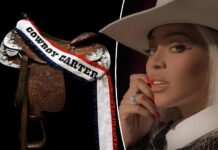*N.W.A.’s genre-defining 1988 single “Straight Outta Compton” and Sister Sledge’s anthem “We Are Family” are among the works that have made it into the National Recording Registry this year.
Each year, the Librarian of Congress picks 25 titles that are “culturally, historically or aesthetically significant” and at least 10 years old. This latest batch spans the years 1888 to 1997 and brings the total number of titles in the Registry to 475.
Also making the cut in 2017 are works from Wilson Pickett, Big Mama Thornton, Scott Joplin, Wes Montgomery and Sonny Rollins, comedy from Richard Pryor, the original cast album of Broadway’s “The Wiz” and black national anthem “Lift Every Voice and Sing.”
Below, more details with descriptions supplied by the Library of Congress:
Straight Outta Compton, N.W.A (1988)
The debut of the seminal rap group N.W.A with its album Straight Outta Compton signaled not only a seismic shift in rap from East Coast to West Coast sensibilities, but also a startling socio-political shot across the bow of the culture. With its at times alarmingly blunt, raw language, imagery and subject matter, the musical partnership of Arabian Prince, Dr. Dre (who co-produced the album), Eazy-E, Ice Cube, DJ Yella and MC Ren ignited controversy (via tracks like “F — the Police”) and ample doses of inspiration with the creative rhymes they showcased and the honesty and force with which they were delivered. Even within the fast-moving, ricocheting world of hip-hop, Compton remains — 30 years after its arrival — one of the definitive works of the genre.
“Lift Every Voice and Sing” (singles), Manhattan Harmony Four (1923); Melba Moore and Friends (1990)
With text written by James Weldon Johnson in 1900 and set to music by his brother John Rosamond Johnson in 1905, the hymn “Lift Every Voice and Sing” has served as the “Black National Anthem” since its adoption by the NAACP in 1919. As with “The Star-Spangled Banner,” no single recording captures the hymn’s essence or its overall meaning to Americans. Therefore, the registry recognizes two recordings: the 1923 version by the Manhattan Harmony Four, one of the last discs issued by the short-lived Black Swan Co. — a pioneering African-American-owned record label based in Harlem — and a modernized 1990 version headed by Moore. Moore sought to restore the standing of the song among young African-Americans. Among the many participants in her latter, all-star recording were Stevie Wonder, Anita Baker, Dionne Warwick and Bobby Brown. The resulting single, which benefited charity, made headlines at the time and helped to raise public awareness of the Johnsons’ anthem.
“Hound Dog,” Big Mama Thornton (1953)
The original version of “Hound Dog” brought together several key figures from the world of early 1950s rhythm and blues. Bandleader Johnny Otis invited composers Jerry Leiber and Mike Stoller, both teenagers, to his house to hear Willie Mae Thornton, a physically imposing singer with a powerful voice. Big Mama inspired them to write “Hound Dog” in a matter of minutes. The song was recorded on Aug. 13, 1952, with Otis on drums and two members of his band providing backup: guitarist Pete Lewis and bassist Mario Delagarde. It would be six months before the disc was released, but the unique mix of styles, rhythms and rhymes made “Hound Dog” a major hit and an enduring classic. “Hound Dog” became a standard of the rock ‘n’ roll era. The song went on to be recorded by many artists, including Elvis Presley.
Saxophone Colossus, Sonny Rollins (1956)
To saxophonist Rollins, the recording of “Saxophone Colossus” didn’t seem that different from any of his previous albums. To jazz fans, however, it would become, along with Way Out West, one of the defining albums of Rollins’ career. With only five tracks and less than 40 minutes, the album may appear slight, but the quality of the music has earned it a place of honor among jazz fans for more than 60 years. Solidly anchored by a rhythm section of drummer Max Roach, bassist Doug Watkins and pianist Tommy Flanagan, Rollins is able to solo with power, grace and humor. On the calypso-based “St. Thomas,” inspired by a melody his mother sang to him, Rollins is at first playful, then harder-edged as the tune segues from a calypso rhythm to a standard jazz beat. “St. Thomas” went on to become not only one of Rollins’ signature tunes but a jazz standard, with dozens of recorded versions.
The Incredible Jazz Guitar of Wes Montgomery, Wes Montgomery (1960)
On Montgomery’s second album for Riverside Records, producer Orrin Keepnews encouraged the guitarist to stretch out more than he had previously, and the record they produced has enduring appeal. Montgomery’s playing is characterized by his trademark thumb-picking technique and frequent use of paired notes an octave apart in his melodic statements, often at staggering speeds. Montgomery’s unique technique was a result of being self-taught that, in the words of saxophonist Ronnie Scott, allowed him to play “impossible things on the guitar because it was never pointed out to him that they were impossible.” In fact, his technique is probably the chief reason he was able to achieve such a full and resonant tone, which did not impede his deft, fluid melodies. On this album, he also is able to switch easily between a variety of styles including swing, up-tempo numbers, ballads and blues while also playing standards and original compositions. The album influenced a wide range of guitarists, including George Benson, Pat Martino and Larry Coryell.
“In the Midnight Hour,” Wilson Pickett (1965)
Though he was only 24 in 1965, Pickett had already logged 10 years as a singer in Detroit gospel and R&B groups and had some intermittent success as a solo artist. When he arrived in Memphis, Tenn., he found a chemistry that had eluded him in earlier recording sessions. Pickett and Stax Records session guitarist Steve Cropper, of the house band Booker T. and the M.G.s, had never met, but in barely an hour, the pair wrote Pickett’s first hit. Atlantic producer Jerry Wexler, whose idea it was to bring Pickett to Stax, suggested a rhythm based on the teenage dance the Jerk, and an arrangement was quickly realized. “In the Midnight Hour” clicked with audiences across the country in the summer of 1965 and firmly established Pickett as a major artist.
The Wiz, original cast album (1975)
An urbanized retelling of L. Frank Baum’s classic The Wonderful Wizard of Oz, The Wiz (as both show and cast album) has endured as a family favorite and cultural touchstone since its debut on the New York stage in 1975. One of the first musicals with an all-black cast in the history of the Great White Way, the musical would go on to win seven Tony Awards, including the one for best musical. Along with showcasing the talents of Dee Dee Bridgewater, Ted Ross and Mabel King, the show made an instant star of its original “Dorothy,” Stephanie Mills. The original-cast album from the show included well-known songs as “Home,” “Don’t Nobody Bring Me No Bad News,” “So You Wanted to Meet the Wizard” and, of course, “Ease on Down the Road.”
Scott Joplin’s “Treemonisha,” Gunther Schuller, arr. (1976)
Scott Joplin’s operatic swan song “Treemonisha” languished in obscurity for decades before a renewal of interest in ragtime spurred scholars to reconstruct the work from surviving vocal and piano scores and perform and record it in the 1970s. Until then, the lone performance of the 1911 work had been a concert read-through with only Joplin on piano for accompaniment. The first of these was presented at Morehouse College in 1972 with orchestration by T.J. Anderson and stage direction by Katherine Dunham. In 1975, the Houston Grand Opera presented a new version orchestrated and conducted by Schuller. Deutsche Grammophon’s 1976 recording of this version sold well and increased audience exposure to Joplin’s “Treemonisha.”
Wanted: Live in Concert, Richard Pryor (1978)
At the height of his career in 1978, Pryor recorded this rare double album of fresh comedy. While a version also was released successfully as a theatrical film, Wanted, the album, epitomizes the art of Pryor’s verbal comedy unleashed. Raised in Peoria, Ill., Pryor grew up in the family “house of ill-repute.” His genius was to live on the edge and manage to laugh about it. His hilarious characterizations of Jim Brown (“Give me the ball”) and Leon Spinks (“Ain’t got no teefes”) were only second to his universe of monkeys making love in trees; German Shepherds that psychoanalyze (“Hey, Rich, what’s the matter?”); and Dobermans snarling (“I want to play!”). Pryor even personified his own heart in a heart attack (“Don’t breathe no more!”) and examined the woods (“Snakes make you run into trees. Snake! … Pow!”). Pryor did not avoid talking about the harder aspects of life, but his sensitivity made him one of the greatest stand-up comedians of all time. This album captures all the hilarity and vulnerability that propelled Pryor to the top of the 1980s comedy boom.
“We Are Family” (single), Sister Sledge (1979)
The four members of Sister Sledge were veteran performers by their early 20s, but as 1979 dawned, they had enjoyed only intermittent success in eight years of recording. A collaboration with the members of the disco powerhouse Chic proved to be the turning point for the family group, and they scored their first major hit early that year with “He’s the Greatest Dancer,” setting the stage for the release of the album and single “We Are Family,” written by Chic founders Nile Rodgers and Bernard Edwards, in May. Twenty-year-old lead singer Kathy Sledge nailed the eight-and-a-half-minute song entirely on the first take, and it seemed to be everywhere through the summer and fall of 1979. The Pittsburgh Pirates made it their theme song, and the group’s performance of it at the opening game of the World Series and the Pirates’ subsequent come-from-behind victory to win the championship made “We Are Family” an anthem, with its own status and meaning.
We Publish News 24/7. Don’t Miss A Story. Click HERE to SUBSCRIBE to Our Newsletter Now!






